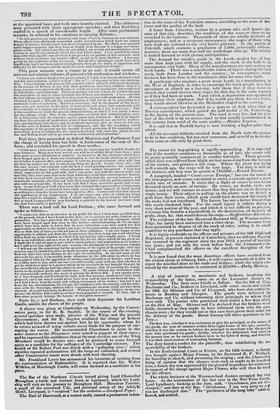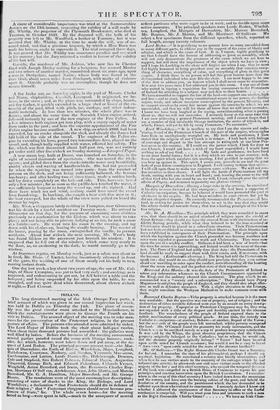A trial of interest to merchants and brokers, involving the
responsibility of the latter, came on at the Lancaster Assizes on Wednesday. The facts were briefly as follow. On the 9th of May, Buchanan and Co., brokers in Liverpool, sold some cassia and cotton
for 8001. for Skinner and Co. of Liverpool, who have also establish- ments in Bombay and Glasgow. The goods were delivered by Buchanan and Co. without informing their principals to whom they were sold. The parties who purchased them failed a few days after, on the 21st of May. Skinner and Co. declared that the brokers were liable, inasmuch as they ought to have informed them who the pur-
chasers were ; for they would not in that case have given their order for the delivery of the goods. Baron Gurney left three questions to the Jury— The first was, whether it was customary to give the principal, or the owner of the goods, the note of contract within forty-eight hours of the sale; second!)', whether it was the custom to inform the principal or merchant who the pat ties were who purchased his goods; thirdly, whether the defendants had acted in the present case as by custom brokers were in the habit of doing, and whether it was their usual manner of transacting business.
The Jury found a verdict for the plaintiffs ; thus establishing the re- sponsibility of the brokers. In the Ecclesiastical Court at Exeter, on the 12th instant, a charge
was brought against Major Pitman, by the Reverend R. P. Welland, for brawling in church, and preventing the singing; and the Chancellor
being of opinion that the charges were such as ought to be inquired into, a future day was appointed for the plaintiff to produce his witnesses in support of the charge against Major Pitman, who will then be tried for the offence.
The whole business at the Westmoreland Assizes occupied but two hours. At the termination of the last case in the Nisi Prius Court, Lord Lyndhurst, looking at the Jury, said, " Gentlemen, you are dis- charged ;" and then at the Bar, "Gentlemen, I am very sorry to s, you are discharged also." The 'gentlemen of the long robe" smile d, bowed, and retired., A cause of considerable importance was tried at the Somersetshire Assizes on the 13th instant, respecting the validity of a will made by Mr. Whitby, the projector of the Plymouth Breakwater, who died at Taunton, in October 1833. By the disputed will, the bulk of his property was left to Mr. Woodford, a banker at Taunton ; but it was asserted that Mr. Whitby, at the time he made the will, was of un- sound mind, and that a previous bequest, by which a Miss Burn was made his heiress, ought to supersede it. The trial occupied three days. It was proved that Mr. Whitby was sometimes peculiar and wayward in his manner ; but the Jury returned a verdict in favour of the validity of his last will.
Garside, the murderer of Mr. Ashton, 'who now lies in Chester Gaol with Joseph Mosley waiting for a hangman, has accused Mosley and two others of another murder, committed about six years ago, upon a man in Derbyshire, named adin ; whose body was found in the river Goit, about seven miles from Stockport, with marks of violence upon it. Garside probably was an accomplice, though he does not accuse himself.





















 Previous page
Previous page